Address: 2nd Street & Walnut, Pittsburg, KS 66762
Phone: 620.231.0499
Website: amazonarmy.com/
The Amazon Army is a finalist for the 8 Wonders of Kansas People because in 1921 this group of several thousand women marched across the coalfields of southeast Kansas in courageous protest against unfair labor laws and practices.
With the discovery of coal in the late 1860s, thousands came to work the mines. Some came to find work, some to escape repression, some to find a new life in America. At one time, this region produced a third of the nation's coal. The mix of some 50 nationalities created an ethnic geography unique to Kansas that came to be known as "The Little Balkans."
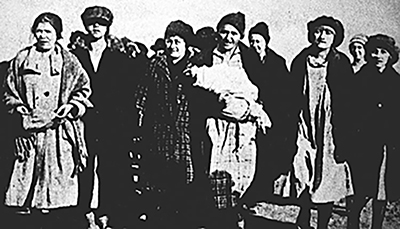
On December 11, 1921 five hundred women from the numerous mining camps in Crawford and Cherokee Counties crowded into a miners hall in Franklin and issued a statement in the name of "the wives of the loyal union men of Kansas" in protest against the unfair labor practices and laws involving hazardous working conditions, poor pay, and discrimination in the coalfields of southeast Kansas.
"Some of the Militant Women" photograph, Pittsburg Daily Headlight. Dec. 19, 1921. Photo courtesy of Army of Amazons © 2000 Linda O'Nelio Knoll
Southeast Kansas coalminers and young boy. Photo courtesy of Leonard H. Axe Library, Special Collections, Pittsburg State University
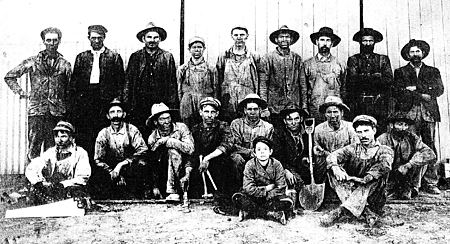
At 4 a.m. the following morning between two and three thousand women assembled at the Franklin Miners Hall to march to the mines. During the next three days, the numbers swelled to as many as six thousand female marchers. The actions were shocking and unheard of for women at that time making headlines across the nation. The New York Times dubbed them "The Amazon Army."
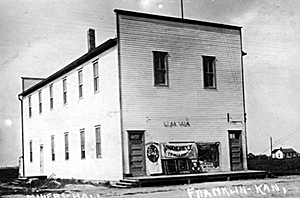
Miners Union Hall, Franklin, Kansas. "Place where the women met to organize and march." Photo courtesy Franklin Community Center & Heritage Museum
Facing the state militia ordered in by Governor Henry Allen, a machine gun attachment sent in from Lawrence, 1,200 rifles stockpiled at the Hotel Stilwell, and 1,000 deputized men "to protect the peace," the women met and marched behind large American flags. They carried no weapon of any kind but were equipped with red pepper to throw in the eyes of the scabs. Marie Merciez volunteered to supply the red pepper from her independent grocery store and black pepper if the red ran out.
 Pittsburg Sun, Dec. 15, 1921. Courtesy Linda O'Nelio Knoll
Pittsburg Sun, Dec. 15, 1921. Courtesy Linda O'Nelio KnollDefying the governor's proclamation that "the Kansas government does not intend to surrender to their... female relatives." They marched for three days to over 60 mines in Crawford County.
Following the march, in which women, some pregnant and carrying young children, were reportedly fired at by union guards rifles at their feet, Sheriff's deputies arrested 49 women on charges of unlawful assembly, assault, and disturbing the peace. They were held in bond of $750, rather than the customary $200. Their leaders included Mary Skubitz and her mother Julia Youvan.
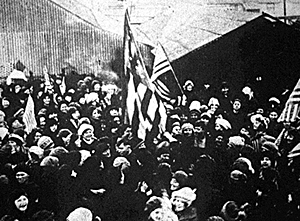
"Rallying around the flag at a mining site." New York Times, Sunday-Section, Dec. 25, 1921. Photo courtesy of Army of Amazons© 2000 Linda O'Nelio Knoll
Joe Skubitz who was 14 at the time, remembered with pride his mother Mary's instructions on how to make the bread the mornings while she would be out marching. Mary's only son would later serve for 16 years as a U.S. Congressman and be instrumental in the passing of the Federal Coal Mine Health and Safety Act of 1969, and The Black Lung Benefits Act of 1972 and The Black Lung Benefits Reform & Revenue Act of 1977.
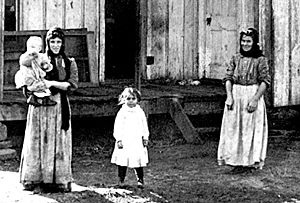 Mining camp wives and children. Photo courtesy Jim DeGruson
Mining camp wives and children. Photo courtesy Jim DeGruson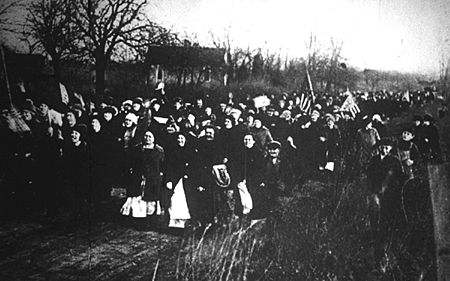
The March of the Amazon Army "The Women's Army of Kansas on the March: The Wives and Daughters of the Striking Coal Miners of the Pittsburgh District Go on the to Oust the Strike Breakers, Invading the Mines and Scattering the Workers With a Red-Pepper Attack." New York Times, Sunday-Section, Dec. 25, 1921. Photo courtesy of Army of Amazons © 2000 Linda O'Nelio Knoll
As a group, the Amazon Army took a courageous stand against injustice and fought for their rights as Americans. This created a volatile history of rebellion and often times turmoil. But the Kansas Balkans remains one of the most progressive influential regions in the state. Reforms such as the 8-hour workday, equal rights for women and minorities, and child labor laws, were all fought for in the coal fields of Southeast Kansas. Source Linda O'Nelio Knoll
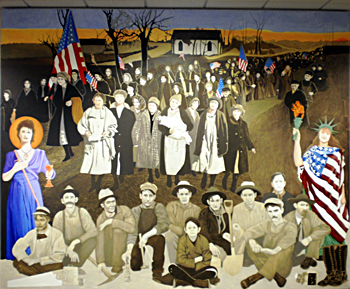 "Solidarity" mural painted in 2000 by Wayne Wildcat, Pittsburg Public Library
"Solidarity" mural painted in 2000 by Wayne Wildcat, Pittsburg Public LibraryPITTSBURG
Miners Memorial, 2nd St. and Walnut. Amazon Army kiosk/marker details the story of the Amazon Army in photos, text and audio recordings. The Miners Memorial & Immigrant Park celebrates the area's rich mining and immigrant history. The park includes a historic marker and map of the areas coal mines, featuring granite monuments honoring the names of the area miners, a large bronze statue of a coal miner and six kiosk stations containing visual/audio information on a variety of mining history--including Big Brutus, Alexander Howat, and the Frontenac Mining Disaster, the state's worst mining catastrophe. Pittsburg Public Library, 308 North Walnut. 620.231.8110. Open Monday-Thursday 9 a.m.-8 p.m.; Friday-Saturday 9 a.m.-5 p.m.; Sunday 1-5 p.m. See the mural "Solidarity" painted by Wayne Wildcat in 2000. It highlights the women marchers and area mining history.
FRANKLIN